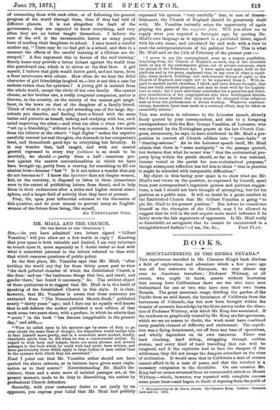MR. MIALL AND THE CHURCH.
[To THE EDITOR OF THE "SPECTATOR."] SIR,—As you have admitted two letters signed " Gilbert Venables," will you allow me a few words in 'eply? Knowing that your space is both valuable and limited, I am very reluctant to trench upon it, more especially as I desire rather to deal with what is somewhat personal in the letters referred to than with
that which concerns questions of public policy.
In the first place, Mr. Venables says that Mr. Miall, "after inviting the world any day for these thirty years past to view 'the dark polluted chamber of which the Established Church is the door,' and see 'the loathsome things that live, and crawl, and gender there,' has found it necessary," &c. The evident object
of these quotations is to suggest that Mr. Miall is in the habit of speaking of the Established Church in this style. It is clear, however, that Mr. Venables is aware that these sentences are
extracted from "The Nonconformist Sketch-Book," published nearly "thirty years" ago ; and I dare say he equally well knows that in self-defence the author published a new edition of that work some two years since, with a preface, in which he admits that " much " in the book "has become inapplicable in the present
day," and adds,—
" Were he called upon in his mattirer age by sense of duty to go ever afresh the same lines of thought, his disposition would incline him to bear himself more gently, and in a somewhat more modest, kindly, charitable spirit, than he did when he was a controversial novice. In regard to both taste and temper, there are many phrases and several passages in the book which he could wish had never been written, and more particularly those which apply to large bodies of men rather than to the systems with which they are associated."
Need I point out that Mr. Venables either should not have quoted the above extracts, or in fairness have given some expla- nation as to their source ? Notwithstanding Mr. Miall's dis- claimer, these and a score more of isolated passages are, at the present moment, made to do duty in discrediting the author by professional Church defenders.
Secondly, with your customary desire to act justly by an opponent, you express your belief that Mr. Miall had publicly
expressed his opinion "very carefully" that, in case of disesta- blishment, the Church of England should be generously dealt with. Mr. Venables instantly seizes the opportunity of again playing the game of the suggestio falsi. Will you allow me to supply what you required a fortnight ago, by quoting Mr. Miall's own language as it appeared in a published letter, signed with his own name, and circulated far and wide with a view to meet the misrepresentations of his political foes ? This is what Mr. Miall said on the 14th of February of the present year :— " I never in my life contemplated, even as a remote possibility, detaching from the Church of England, as such, any of the churches built, or any of the endowments given, out of private resources, since the period of the Toleration Act. I have again and again, both on the platform and in the press, explained that, in my view of what is equit- able, these modern buildings and endowments belong of right to the Church of England, and ought not to be separated from it. With re- gard to ancient parish churches, I think, and have always thought, that they are truly national property, and may be dealt with by the Legisla- ture as such; but I have uniformly contended for a generous and indul- gent consideration of the congregations who have worshipped therein. But I have never desired that they should be alienated from religious uses or from the performance of divine worship. Whatever represen- tations, therefore, have been made to a contrary effect, may be taken as essentially untrue."
This was written in reference to the Leicester speech, already freely quoted by your correspondent, and also to a foregoing
correspondence with the Rev. George Venables, of Leicester, who was reported by the Nottingham papers at the last Church Con- gress, erroneously, he says, to have attributed to Mr. Miall a pro- position to convert all Church edifices into " music-halls " or "dancing-saloons." As to the Leicester speech itself, Mr. Miall admits that there is "some ambiguity" in the passage quoted, but declares that what he meant was "that the ecclesiastical pro- perty lying within the parish should, so far as it was national,
become vested in the parish for non-ecclesiastical purposes," though subsequent reflection has led him to think "that in practice it might be attended with insuperable difficulties."
My object in thus taxing your space is to show what are Mr. Miall's real views on the question, as expressed by himself, apart from your correspondent's ingenious glosses and partisan sugges- tions, a task I should not have thought of attempting, but for his position as a public man. It will no doubt be a great comfort to the Established Church that Mr. Gilbert Venables is going "to pin Mr. Miall to his present position." But before he constitutes himself as the champion of the Church, may I be allowed to suggest that he will in the end acquire more moral influence if he fairly meets the fair arguments of opponents. Is Mr. Miall really so formidable an antagonist that he cannot be encountered in a, straightforward fashion am, Sir, &c., FAIR PLAY.


































 Previous page
Previous page